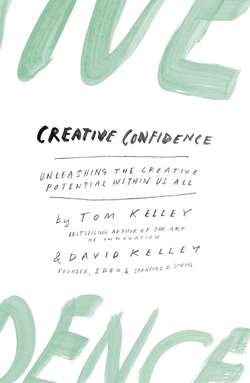Читать книгу Creative Confidence: Unleashing the Creative Potential Within Us All - David Kelley - Страница 27
LET GO OF COMPARISON
ОглавлениеIt takes courage to leave the land of certain outcomes and the comfort of what we know to try a new approach or share a wild-sounding idea. In her research on insecurity, Brené Brown talked with a thousand people to identify what makes them feel inadequate and to understand the downward spirals of feeling “not good enough.” As Brown writes: “When our self-worth isn’t on the line, we are far more willing to be courageous and risk sharing our raw talents and gifts.” One way to embrace creativity, Brown says, is to let go of comparison. If you are concerned about conforming or about how you measure up to others’ successes, you won’t perform the risk taking and trailblazing inherent in creative endeavors.
Over the years, we’ve noticed from teams we’ve worked with that when people are insecure, they’re not at their best. If they don’t feel like they have the respect of their peers or their boss, they try to boost themselves through self-promotion. Instead of focusing on their work and feeling good about what they produce, they get sidetracked worrying about what other people think.
Once that insecurity takes hold, it can create a vicious circle. So whether you work alone or with a team, try hard to disarm it at the earliest opportunity. Give other people credit when it’s due. Pay attention to signs that someone around you is feeling undervalued or has lost his or her self-confidence. Have that difficult conversation with the people around you to air out the issue. Because when you don’t address insecurity, it’s like the family secret that everyone knows but no one talks about. The conversation may be uncomfortable and painful but is often worthwhile in the long run.
We’ve seen the pattern dozens of times at IDEO where new employees are uncertain or tentative at first, trying to “be on their best behavior.” And then over time, they let down their guard. You see the transformation in the way they dress and the way they act around people they see as authority figures. As they become more confident, they eventually adopt a bring-your-whole-self-to-work attitude and allow themselves to be vulnerable in a creative context. This vulnerability and ability to trust the people around you can help to overcome so many of the barriers to creative thinking and constructive behavior.
Our experience mirrors current research on resilience. Resilient people, in addition to being resourceful problem solvers, are more likely to seek help, have strong social support, and be better connected with colleagues, family, and friends. Resilience is often thought of as a solo effort—the lone hero who falls and rises up again to do battle. In reality, however, reaching out to others is usually a strategy for success. It doesn’t have to be an admission of weakness. We need others to help us bounce back from adversity and hardship.
